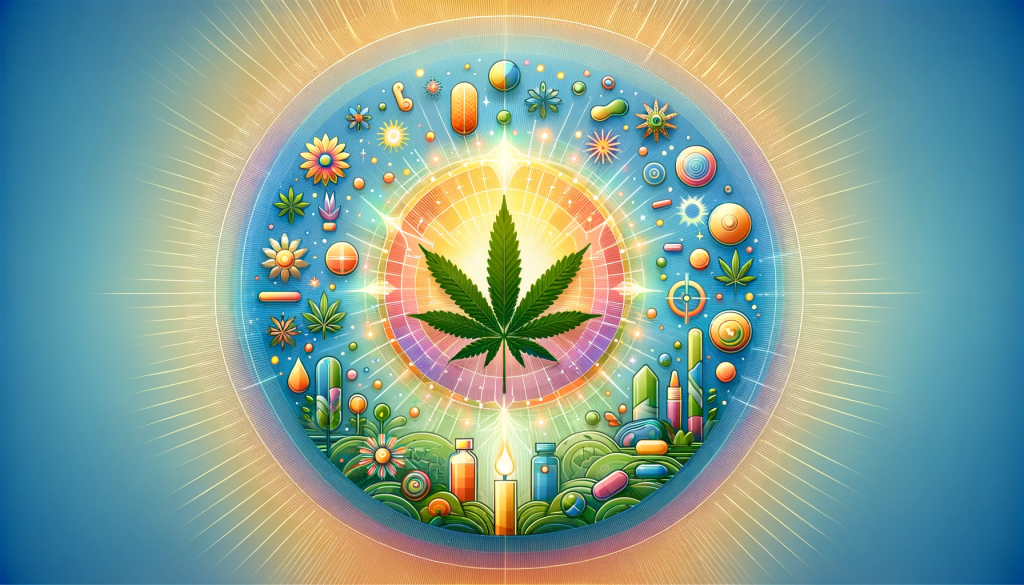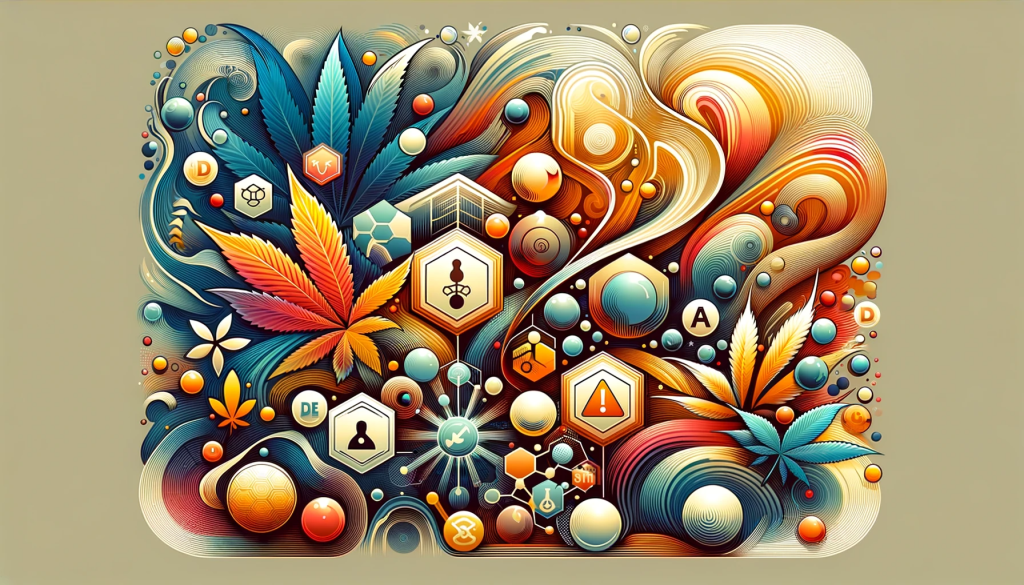Delta-8 THC is becoming increasingly popular in the cannabis market, but it can be confusing for some to understand. Delta 8 is a compound extracted from the cannabis plant, related to delta 9, also derived from the cannabis plant. It shares similar compounds and produces effects that are slightly milder than those of the traditional cannabis product.
Today, we’re looking at delta 8 THC in depth and answering all your questions about what it does and how it works. We also address safety concerns and adverse events and its potential health benefits, risks, and side effects. Then, we’ll touch on federal law, the Agriculture Improvement Act, and delta-8’s changing legal status with regard to controlled substances.
We invite you on an educational journey into understanding delta 8 THC. You can make more informed purchases or use decisions with our comprehensive answers based on our extensive cannabis research.
Basics of Delta-8 THC

Delta-8 THC is a lesser-known cannabinoid found in the Cannabis Sativa plant. It occurs in smaller traces than its more commonly known counterpart, delta-9 THC.
What is Delta-8 THC?
Delta-8 THC is a cannabinoid found in the cannabis plant that produces mild psychoactive effects. It is chemically similar to delta-9 THC, the main component of marijuana, but has fewer side effects associated with it, such as paranoia and anxiety.
Delta-8 THC is obtained through a chemical synthesis process of cannabidiol (CBD), which can be extracted from Cannabis sativa plants. When consumed, it interacts with the body’s endocannabinoid system to produce feelings of relaxation, increased focus, and mental clarity without causing intense euphoria like its more potent counterpart, delta-9 THC.
Currently, there are no long-term studies on its safety or potential health impacts, so caution should be taken when deciding whether or not to use this product.
IndaCloud
<p>A minor yet extraordinary cannabinoid, Delta 8 THC, is capturing the interest of wellness and recreational users alike. Its unique molecular structure differentiates it from its counterpart, Delta 9 while offering many potential benefits.</p>
Shop NowWhere does it come from?
Delta-8 THC is a naturally occurring cannabinoid found in trace amounts in the cannabis plant. It can be extracted from both marijuana and hemp plants, which, depending on a country’s regulations, may be grown legally as sources for THC products.
It can also be synthetically produced as a byproduct of either the CBD or delta-9 THC extraction process. Synthetic delta 8 produces more consistent potency and quality compared to its naturally occurring variety, which often has inconsistent potency and quality due to the variables of crop yields and other growth factors.
How is it different from other cannabinoids?
Delta-8 THC is a cannabinoid, like delta-9 THC and CBD, but with milder psychoactive effects. Unlike CBD, delta-8 produces euphoric effects similar to those of delta-9, although the intensity of these effects is much less pronounced.
Delta 8 is often referred to as “marijuana lite” or “diet weed” since it’s not nearly as potent as its well–known cousin, delta-9 THC. Delta 8 is naturally found in cannabis in lower concentrations than that of pure delta 9 tetrahydrocannabinol and may be derived from hemp (a variety of the Cannabis sativa plant).
It interacts with the body’s endocannabinoid system, just like other cannabinoids will, but its unique chemical structure produces different physical and psychological responses compared to those of delta 9 THCs alone. This is a significant factor distinguishing this compound from others.
How Does Delta-8 THC Work?

Delta-8 THC interacts with the body’s endocannabinoid system and produces psychoactive effects.
Interaction with the body’s endocannabinoid system
Delta 8 THC is a type of cannabinoid, similar to delta 9 THC, that interacts with the body’s endocannabinoid system (ECS). It has been found to have a strong affinity for CB1 receptors found in the ECS and is thought to activate an arachidonic acid pathway via this receptor, which leads to behavioral suppression in rats.
The majority of pharmacological studies focus on its potential effects on the central nervous system. As it binds both CB1 and CB2 receptors, it may be seen as a viable therapeutic option due to its psychoactive effect when interacting with these pathways, allowing for modulation of pain relief, anxiety and depression management, nausea reduction, and appetite stimulation potentials.
Psychoactive effects
It has milder and less potent effects compared to delta-9 THC, thus producing fewer side effects. Delta-8 THC produces euphoric effects that are similar to those caused by its counterpart, but they tend to be milder.
The psychoactive compounds of delta-8 work through interaction with the body’s endocannabinoid system. This creates a feeling of euphoria, relaxation, enhanced focus, and creativity depending on other factors such as dosage taken. When used responsibly, it can help treat certain mental health issues like anxiety or depression while also providing relief for physical conditions such as pain or nausea.
Potential Benefits of Delta-8 THC

Delta-8 THC and other emerging cannabis-derived products may address a range of therapeutic or medical uses, such as pain relief, management of anxiety and depression symptoms, and the stimulation of appetite and alleviation of nausea.
Pain relief
Delta-8 THC has become known for its possible pain-relieving properties and is gaining popularity in the medical cannabis community. It interacts with the body’s endocannabinoid system, a crucial biological system responsible for regulating our physiology, behavior, and moods.
This interaction may reduce inflammation and provide other beneficial effects, including pain relief. Most users report that delta-8 THC helps to alleviate aches and pains associated with conditions such as arthritis or muscle injury, while others report improvements in general daily discomfort such as headaches or neck pains.
As more evidence of its therapeutic effects begins to emerge, individuals looking for natural ways to ease their chronic suffering without any psychoactive side effects may benefit from using delta-8 THC. People with certain physical or psychological concerns may enjoy sampling THC-bonded cannabis products like delta 8 flowers & vape cartridges, available for purchase online in many countries and in some states, even in convenience stores or gas stations.
Anxiety and depression management
Delta 8 THC has been studied for its potential role in helping manage anxiety and depression-related symptoms. It is believed to interact with the body’s endocannabinoid system, which helps regulate mood, emotion, and cognition.
When ingested or inhaled, delta 8 releases molecules that bind to details located on cells known as cannabinoid receptors. A new cell pathway is created through this binding process, which affects how we feel mentally and physically.
This creates a chemical reaction within the brain, releasing neurotransmitters such as dopamine, the pleasure hormone, serotonin, the focus or reward hormone, and anandamide, which is involved in our reward center pathways.
These effects may contain calming properties, making it potentially beneficial for those who suffer from anxiety or depression-related disorders. It may alleviate their symptoms, decrease intrusive thoughts, and reduce stress levels while improving mental well-being overall without producing the psychoactive side effects delta-9 THC does.
Nausea and appetite stimulation
Delta-8 THC has been reported to have the potential to alleviate nausea and stimulate appetite. In preclinical studies, delta-8 THC was found to reduce nausea in rats as well as increase their food intake.
Additional research has suggested that delta-8 can increase hunger when it interacts with the body’s endocannabinoid system. This may be particularly beneficial for people experiencing reduced appetite due to chronic illnesses such as cancer or HIV/AIDS.
In a 2018 study, researchers discovered that administration of delta-8 THC improved symptoms of anorexia (loss of appetite) more than similar doses of other cannabis compounds like delta-9 THC or CBD alone.
Potential Risks and Side Effects

Knowing the potential risks associated with delta-8 THC and other hemp cannabis raw extracts, as well as any possible side effects, is necessary for informed consumption.
Potential risks and dangers
Delta-8 THC has the potential to cause a range of different side effects, including psychosis, severe vomiting, addiction, paranoia, hallucinations, tremors, and anxiety. Other more mild effects may include dizziness and confusion.
In addition to these psychological effects, it is also possible that regular use of delta-8 THC can lead to extreme tiredness due to its sedative nature, as well as decreased blood pressure and slowed heart rate.
Other risks associated with using delta 8 THC include adverse drug interactions leading to liver toxicity or reproductive and developmental problems. For this reason, consumers must familiarize themselves with any potential risks before trying delta 8 products for the first time.
Common side effects
- Dry mouth (also known as “cotton mouth”)
- Anxiety
- Drowsiness
- Slow reaction time
- Memory impairment
- Increased heart rate
- Red eyes
Legality of Delta-8 THC
Understanding the current legal landscape around delta-8 THC is essential before trying any products, so be sure to research laws in your area.
Current legal status
Delta-8 THC is federally legal in the United States, as it is derived from hemp, which was legalized under the 2018 Farm Bill. However, there are currently no laws or regulations specifically addressing this cannabinoid, and its products have not been evaluated by the FDA for safe use.
Although certain states have their own specific rules related to delta 8 THC, transportation of this product within US borders is generally permissible at this time. Further evaluation from federal agencies will be needed to determine whether any additional restrictions should apply to delta-8 THC products.
Changes in regulations
Since 2018, 15 U.S. states have implemented bans on products containing delta-8 THC. Additionally, many states like Colorado, Montana, New York, and Oregon have imposed age restrictions as well as banned the use of hemp-derived delta-8 within their state boundaries.
The regulation of delta-8 has become a hot topic lately, with the DEA‘s 2022 executive order set to further tighten up rules and regulation on delta 8, followed by Missouri’s “New Hemp Bill” that proposes even stricter regulations specific to delta 8’s sale and consumption within its state lines.
Legalities surrounding delta-8 are changing rapidly, so it is best to stay informed about your local laws before using or purchasing any product containing delta-8 THC.
Ways to Consume Delta-8 THC
There are several ways that delta-8 THC products can be consumed, including inhalation, edibles, tinctures, and oils. Whether you’re looking for a way to reduce pain or manage anxiety or another condition, consider exploring the potential of delta-8 THC.
Inhalation through vaping or smoking
Delta-8 THC is a cannabinoid molecule found in hemp and cannabis plants. It can be consumed through inhalation by vaping or smoking, some of the most popular methods for consuming delta-8 THC.
When inhaled, it interacts with the body’s endocannabinoid system to produce its effects.
The manufacture of Delta-8 THC requires the use of chemicals like benzylic acid and anhydrous ammonia, which are known to have potential health risks if exposed to or inhaled for prolonged periods of time.
Consuming these potentially unsafe household chemicals directly, regardless of whether they come from products containing delta 8, has been linked to serious health risks, including carcinogenic effects and organ damage over long durations.
Edibles
Delta-8 THC edibles are becoming an increasingly popular way to enjoy the effects of delta-8. Whether in gummy form, baked goods, or other product forms that resemble non-psychoactive items, edibles have become a convenient and favored method of consumption.Some users report feeling its medicinal benefits faster by eating it than through more traditional methods of consumption, such as smoking or vaping.
Users also report positive experiences while consuming delta 8 in edibles due to its unique characteristics. It may be a great choice for people who want pain relief without the psychotropic sensation associated with stronger cannabis doses.
Tinctures and oils
Tinctures and oils are efficient, discreet, and long-lasting forms of Delta-8 THC consumption. Delta-8-THC in oil or tincture form is easy to store, package, and transport. This form also allows users to precisely measure out doses.
Further, when ingested sublingually rather than through inhalation (like smoking or vaping), delta 8 THC may have longer-lasting effects that can reach peak concentration within 20–30 minutes. And, the half-life (the amount of time it takes for half of the dose taken to be eliminated by the body) can be up to 12 hours depending on dosage and other factors like weight and metabolism.
Users often report feeling more alert after ingesting delta 8 than when using other cannabinoids due to its different molecular makeup as compared to most traditional hemp products containing only high levels of CBD. Users also note a stronger mental buzz accompanied by potentially decreased instances of anxiety calming or sedated feelings relative even cannabinol-based options.
Final Thoughts
In conclusion, delta-8 THC is a novel cannabinoid with potential therapeutic benefits that can be delivered through various products such as vapes, tinctures, and edibles. It is gaining more popularity in the cannabis market due to its effects, which are similar to those of delta-9 THC yet milder and less intoxicating.
While research on the compound continues to progress slowly, it has been found to potentially provide relief from pain, nausea, or appetite stimulation, as well as serve as an aid to manage symptoms of anxiety or depression.
Of course, using any product containing this type of cannabinoid entails certain risks, so it’s important for individuals undergoing treatment with delta 8 THC products should proceed cautiously under medical supervision.
Regulations concerning this cannabinoid need further development and implementation before its full potential can be realized, though a larger scale study is needed to identify all health risks associated with it.
Other Forms of THC to Explore
FAQs
1. What is Delta 8 THC?
Delta 8 THC is a new type of cannabinoid found in hemp and cannabis plants, which provides similar effects to those of regular THC but with less potency.
2. How does Delta 8 THC work?
Delta 8 THC works similarly to the more commonly known tetrahydrocannabinol (THC) by binding to brain receptors responsible for controlling pain responses, mood regulation, appetite, sleep patterns, and memory formation.
3. Are there any side effects when using Delta 8THC?
Yes, some common side effects of taking Delta 8 include dry mouth or increased heart rate. More serious reactions, such as anxiety or paranoia, can also occur if taken in excessive amounts or without proper medical supervision.
4. Is it legal to use Delta 8TCH?
It depends on your location; although it has been federally legalized through the 2018 Farm Bill reclassification of hemp products containing less than 0.03% Total THC content by dry weight from a Schedule I controlled substance, its legality may vary depending on state laws in some areas and other countries worldwide.






